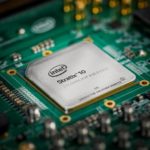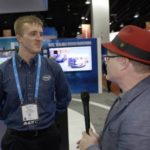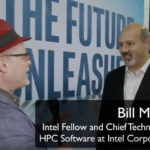FPGAs can improve performance per watt, bandwidth and latency. In this guest post, Intel explores how Field Programmable Gate Arrays (FPGAs) can be used to accelerate high performance computing. “Tightly coupled programmable multi-function accelerator platforms, such as FPGAs from Intel, offer a single hardware platform that enables servers to address many different workloads needs—from HPC needs for the highest capacity and performance through data center requirements for load balancing capabilities to address different workload profiles.”
Intel SC17 Booth Tour: Driving Innovation in HPC
In this video, David Warberg gives us a quick tour of the Intel booth at SC17. “Intel unveiled new HPC advancements for optimized workloads, including the the addition of a new family of HPC solutions to the Intel Select Solutions program. Built on the latest Intel Xeon Scalable platforms, Intel Select Solutions are verified configurations designed to speed and simplify the evaluation and deployment of data center infrastructure while meeting a high performance threshold.”
Intel Steps up to HPC & the Enterprise with FPGAs
In this video from the Intel HPC Developer Conference in Denver, Michael Strickland describes how Intel FPGAs are powering new levels of performance and datacenter efficiency with FPGAs. “Altera and Intel offers a broad range of FPGA devices – from the high performaning Stratix series to the flexible MAX 10 – so you can find a device that best meets your business needs.”
Accelerating Cryo-EM with Intel Technologies
In this video from the Intel HPC Developer Conference, Erik Lindahl from Stockholm University describes the challenges of cryo-EM, a technique that fires beams of electrons at proteins that have been frozen in solution, to deduce the biomolecules’ structure. “Structural biology is going through a revolution where cryo-EM now determine 3D structures from 100,000s of noisy images, but it relies on very large computations. I will present our work with Intel to accelerate the RELION program with x86 SIMD, TBB, and MKL to provide outstanding performance.”
Intel Xeon Processors and Intel Omni-Path Architecture Offer Breakthroughs for Top500 Systems
Last week, the rhetorical one-two punch of the Intel HPC Developer Conference and Supercomputing 2017 offered global HPC aficionados new insights into the direction of advanced HPC technologies, and how those tools will empower the future of discovery and innovation. In case you missed it, here is a breakdown of all the action.
Video: ZFS Improvements for Lustre
In this video from LAD’17 in Paris, Adreas Dilger from Intel presents: ZFS Improvements for Lustre. “Lustre is the Parallel file system of choice for High Performance Computing and large file applications. To meet the capacity and throughput requirements of HPC workloads, Lustre has traditionally required adoption of custom proprietary storage products leading to vendor lock-in and reduced innovation. The evolution of software defined high availability platforms like ZFS running on Linux now make it possible to meet the performance requirements of HPC on open industry standard x86 platforms.”
Intel Select Solutions for HPC Debut at SC17
Intel Select Solutions HPC provide a fast path for purchasing and deploying a cluster for simulation and modeling workloads with a pre-validated selection of components designed to meet the demands of HPC applications and workflows. These systems provide the capabilities and agility needed to support a range of different workloads and reduce or eliminate the need for multiple single-purpose systems. In addition, the performance of key system characteristics are verified for Intel Select Solutions for Simulation and Modeling at both the node and cluster level.
Lenovo Steps up with Intel Select Solutions for HPC
In this video, Trish Damkroger from Intel and Madhu Matta from Lenovo describe how Intel Select Solutions for HPC make it easy to scale application performance. “Intel Select Solutions HPC provide a fast path for purchasing and deploying a cluster for simulation and modeling workloads with a pre-validated selection of components designed to meet the demands of HPC applications and workflows.”
Catch Today’s ‘Artificial Intelligence and The Virtuous Cycle of Compute’ Presentation by Intel
At SC17, Intel is reinforcing its ongoing commitment to HPC and AI technologies. If you want to learn more about Intel’s investment in Artificial Intelligence, and the convergence with HPC, then be sure to catch the future-focused presentation on “Artificial Intelligence and The Virtuous Cycle of Compute” by Pradeep Dubey, Intel Fellow, and Director of Parallel Computing Lab.
SC17 Preview: Artificial Intelligence and The Virtuous Cycle of Compute
In this video, Pradeep Dubey from Intel Labs describes his upcoming SC17 Invited Talk on Artificial Intelligence. “Dubey will discuss how the convergence of AI, Big Data, HPC systems, and algorithmic advances are transforming the relationship between computers and humans, disrupting past notions of a partnership where humans made all the “intelligent” decisions.”












